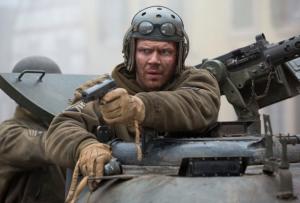Even at its most stunning, ‘Fury’ still stunningly generic
It’s certainly easy to draw comparisons of “Fury” to previously released World War II-set epics, from the more factual (“Saving Private Ryan”) to the more fictional (“Inglorious Basterds”). “Ryan,” for example, also featured the battle through the eyes of a fresh-faced recruit and a heavy focus on the sheer violence and brutality of war. And “Basterds,” in particular, shares lead Brad Pitt as a Southern-speaking Army fella hell-bent on Nazi slaying.
I wish I could say that “Fury” contained something that those other two films did not that set it apart, but I am struggling to find something - anything - that would distinguish the film to merit additional praise. It’s certainly technically impressive, from both a cinematographic and special effects perspective. Director David Ayer reteamed with his “End of Watch” cinematographer Roman Vasyanov to frame some beautiful and brutal shots, and the battles are as gruesome and bloody as any seen in war films to date.
It certainly looks as though there was an amazing attention to detail to tell the (completely fictional) tale of a tank crew making a last stand against an encroaching group of SS soldiers. But in all that, Ayer (who also wrote the script) didn’t turn that same attention to detail on his characters, or a narrative in which they could exist with purpose and meaning. Brad Pitt plays Sgt. Don "Wardaddy" Collier, the commander of a Sherman tank crew who is dutifully dispatched smack-dab in the center of enemy territory.
As always, Pitt is outstanding, but there is only so much he can breathe into this character. Since there is no Quentin Tarantino feeding him lines like: “You probably heard we ain't in the prisoner-takin' business; we in the killin' Nazi business. And cousin, business is a-boomin',” he is left with cliched lines such as: “Ideals are peaceful; history is violent,” and, “It will end soon. But before it does, a lot more people gotta die.”
The rest of the cast does its best with their own limited material, but it is rather frustrating that even though we are crammed inside the tank with these boys for a good chunk of the film, we never really get to know any of them. Michael Pena, who was so dynamic in Ayers’ “End of Watch,” is no more than “the Hispanic character.”
It’s not that “Fury” is a bad film; it just does not feel as though it has anything to add to the conversation. The list of superlative war films is long - “Apocalypse Now,” “The Deer Hunter,” “Black Hawk Down,” “Das Boot,” “Downfall,” “Platoon,” “Stalingrad”… hell, even “Band of Brothers.” But “Fury” will not share the same longevity as those films, as even when it’s at its most stunning, it’s still stunningly generic.
















































